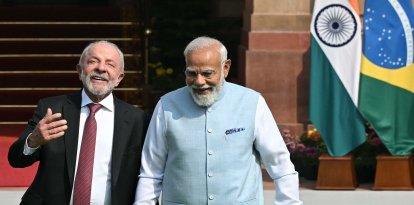The United Kingdom: Voter disenchantment and disillusionment
It was a Tory debacle, not a Labour overthrow.

New Prime Minister KEIR STARMER arrives at Downing Street in London.
The general election held this Thursday in the United Kingdom has revealed a political landscape marked by the disenchantment of the electorate. Although the Labour Party emerged as the winner with 421 seats (the absolute majority stands at 326), his victory should not to be attributed to the British people´s overflowing enthusiasm. There has actually been a notable erosion of support for the traditional right-wing option of the Conservative Party (Tory) and for the peculiar British electoral system, which makes the candidate of the party with the most votes in each of the 650 constituencies a Member of Parliament, leaving the others without representation.
Electoral participation at historic lows
One of the most eloquent signs of this citizen disaffection is that sinking participation, which is expected to fall to 60%, is the second lowest since 1885, with the fewest voters (59%) ever in 2001. Apathy and distrust in a political class that is ineffective and disconnected from the needs of the citizenry is patent.
A Labour Party that sweeps according to the system, not according to the votes
The Labor Party has obtained an overwhelming parliamentary majority. However, it holds 64% of the seats (211 MPs more than in the previous elections) with a vote share of 34%, much lower than that obtained by Tony Blair to achieve an equivalent majority in the Commons. It should be recalled that in the 2017 elections, and with a higher turnout, Labour obtained 40 % of the vote, but was totally defeated in the actual number of seats. It has been a Tory debacle, not a Labour overthrow.
Conservative collapse and the rise of other parties
The Conservative Party, which in the previous elections had achieved exceptional results, suffered a significant collapse, obtaining only 19% of the seats (121 deputies) with 24% of the vote. Two hundred and fifty MPs less. This result marks the end of a generation of Conservative leaders, whose weariness with public relations and the general perception of them as an inbred organization focused on personal privilege have alienated many of their traditional voters.
The Tories benefited in the December 19 election from the expectations created by Brexit, promising to restore control of national affairs and more effective management outside the European Union. However, the results have been disappointing: a large parliamentary majority failed to efficiently manage the real problems of citizens, to offer a more accessible government, far from the head honchos in Brussels, that would develop a new national project after Brexit (the Tories lost a massive amount of seats in areas that voted to leave the EU, which is where the Reform Party won them over). None of the expectations around deregulation and attractive taxation for global investment have materialized. Healthcare and infrastructure are very poor, the quality of the education system has badly eroded, access to housing is a serious problem and citizen security has also significantly deteriorated. Along with this, the perception that the Tories adopted in many cases the narrative imposed by the left, abandoning any attempt to offer an alternative ideological position on issues of family, taxes and personal liberties, and the lack of a national project are factors at the root of the emergence of the Reform Party. Additionally, the disastrous management of the Covid crisis as well infighting, with multiple leadership changes and three prime ministers since the last election, have exacerbated the perception of elitism and division. All this has led to disaster for the Conservative Party.
Disproportionate representation
Disenchantment with the Conservatives has not translated into a massive increase in the Labour vote. Instead, the Reform Party, of a more uncomplicated conservative bent, has vigorously emerged, and the centrist Liberal Democratic Party has re-emerged. Both parties have captured a significant portion of the vote of those disenchanted with the traditional options.
The disparity in parliamentary representation is even more evident when the results of these two rising parties are examined. While the Reform Party, despite having captured 14% of the vote, now has minimal representation in Parliament, with only 1% of the seats (4 seats), the Liberal Democrats, with a vote share of around 12%, have won an equivalent percentage of seats with 71 seats. With fewer votes than the reformists and only two points more votes nationally compared to 2019, the Liberal Democrat Party gains an additional 63 MPs and reaches levels of representation not seen since the 19th century.
The Tories have not bled through the center: they have done so from the right. It is noteworthy that the sum of the percentage of Tory and Reform Party votes, although it would not have prevented the electoral defeat of the Conservatives, could have saved multiple seats for the right. To exemplify the true impact of the Reform Party in these elections: it came second in 103 constituencies, in 12 of them less than 5,000 votes behind the first. It is estimated that if all the votes of the Reform Party had benefited the Tories, the latter would have obtained 180 more seats. Interestingly, unlike in nations such as Spain, right-wing analysts do not blame the Reform Party or its voters for the defeat, but the Conservative Party for its inability to inspire and mobilize its natural voters.
Transformations on the left
On the left, it was simply a matter of abandoning the perception of a radical and extremist leadership. The new Prime Minister, Keir Starmer, is a leader who is not very charismatic, but does not generate the antagonisms of former Labour leaders such as Jeremy Corbyn, who had made that party an unviable option. Corbyn himself has been voted off the Labour lists. Labour is also losing votes in Muslim-majority areas to a number of extremist candidates from the so-called pro-Hamas camp. This shift marks the first time that radical political Islamism has had significant representation in Parliament.
The Labour Party has also benefited from the electoral collapse of the Scottish National Party (SNP), plagued by scandals in its leadership and with an aimless pro-independence project. The SNP has suffered a serious defeat, with its share of the vote reduced by 15 points, while Labour's has increased by 17 points in Scotland. It now looks like the SNP will win no more than 10 seats by the end of the count.
The political future of the United Kingdom
The outcome of this election suggests a reconfiguration of the British political landscape. The electoral system has allowed an over-representation of the Labour Party, but the real change can be seen in the diversification of the vote and the growth of new political forces.
A number of questions arise from today that will be answered in the coming months: will the new Prime Minister succeed in moderating the more militant and Marxist instincts of many of his party's activists? What position will the new government adopt on the role of the United Kingdom in the world outside the European Union and the measures needed to regain competitiveness (the foreseeable rise in taxes and the regulatory and intrusive eagerness of the left wing are reasons for more concern than hope)? Will Islamism have a voice that is distinct from that of the traditional left in Parliament? Will the Conservative Party read its defeat as a message to strengthen its ideological base and differentiate its proposals from those of the left? What new generation of leaders will captain the transition of the Tory party and what will be its future relationship with the Reform Party and its proposals? How will the disenchantment of those 40% of abstentionists and 14% of Reform Party voters who are likely to continue to feel disillusioned and massively under-represented in this House of Commons, as a result of an electoral system that prioritizes the proximity of each MP to his or her constituents but leaves large parts of the electorate without a parliamentary voice, evolve?
























